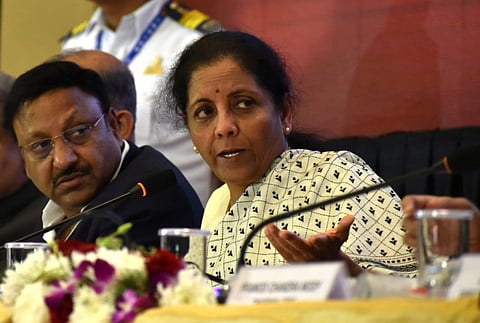

HYDERABAD: Union Minister Nirmala Sitharaman said that no timeline has been decided yet regarding the removal of tax exemptions and making alternative tax rates that were announced in the Union Budget-2020 as is the norm.
However, she added that the aim was to eventually have a “simplified, exemption-free tax regime with reduced rate of taxes” in the country.
Speaking to the media here on Sunday, she said at the moment, the government has started an alternative tax rate regime with some exemptions removed or added, although the original intention was to remove all the exemptions and have a clear, simplified and reduced rate of income tax.
She pointed out that in this alternative, the gradient of the increase in tax for different income slabs is gentle and there was no sharp increase.
Sitharaman said the government did not compel anyone to leave tax exemptions and adopt the alternative tax regime, but for the sake of clarity it issued the complete matrix, to give an idea of an old system vis a vis the new system.
Poor collection of GST compensation cess blamed for delay in dues to states
She added that based on the simulations, it has been estimated that the alternative tax rates if it was implemented last year, would have benefitted around 69 per cent of the taxpayers while about 11 per cent would have adopted the new system.
When asked about the lack of GST compensation devolution to Telangana, she said this problem was being faced by all the States and blamed it on the poor collection of GST compensation cess.
As per the GST law, the Central government can devolve funds only through compensation cess.
Regarding the decrease in devolution of share from Central taxes to the States from 42 per cent to 41 per cent, Sitharaman said the reason behind it was decreasing in the number of States by one and two new Union Territories coming into existence - Ladakh and Jammu and Kashmir.
Sitharaman also said the Centre increased the total allocation for Ministry of Rural Development from Rs 1,17,647 crore in 2019-2020 to Rs 1,20,147 crores in 2020-2021.
She said there has been no reduction in the allocation of funds to any programme, including the demand-driven MNREGA, for which the allocation increased from Rs 60,000 crore to Rs 61,500 crore.
Regarding the reduction of GST rates, the Union Finance Minister said the State governments should be impressed upon the need for the same and that the government has to look into the fact that there were no issues of inverted duty structure.
Clearing the air on budget
The Finance Minister was in Hyderabad to participate in an interactive session with industry representatives, economists, professors and professionals on Union Budget, organised by the Hyderabad Customs and GST Zone along with Income Tax division of AP and TS. At the session, she was asked a variety of questions.